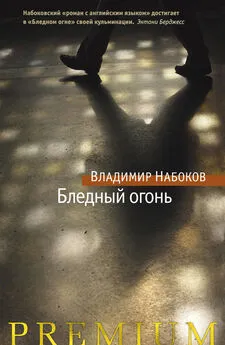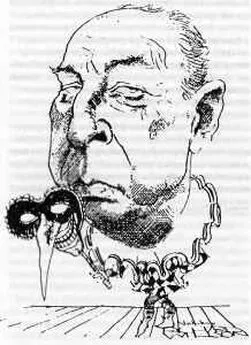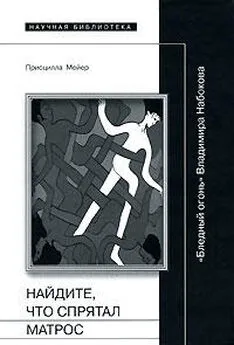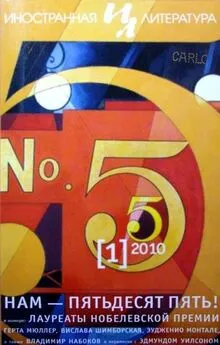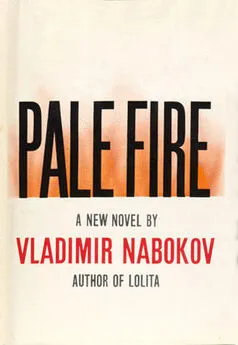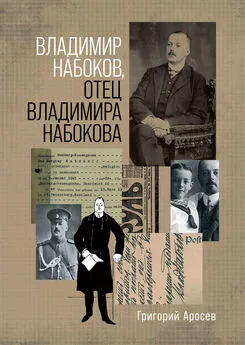Владимир Набоков - Бледный огонь
- Название:Бледный огонь
- Автор:
- Жанр:
- Издательство:Азбука, Азбука-Аттикус
- Год:2013
- Город:Москва
- ISBN:978-5-389-08383-7
- Рейтинг:
- Избранное:Добавить в избранное
-
Отзывы:
-
Ваша оценка:
Владимир Набоков - Бледный огонь краткое содержание
Бледный огонь - читать онлайн бесплатно ознакомительный отрывок
Интервал:
Закладка:
I cannot understand why from the lake
I could make out our front porch when I’d take
Lake Road to school, whilst now, although no tree
Has intervened, I look but fail to see
Even the roof. Maybe some quirk in space
Has caused a fold or furrow to displace
The fragile vista, the frame house between
Goldworth and Wordsmith on its square of green.
I had a favorite young shagbark there
50 With ample dark jade leaves and a black, spare,
Vermiculated trunk. The setting sun
Bronzed the black bark, around which, like undone
Garlands, the shadows of the foliage fell.
It is now stout and rough; it has done well.
White butterflies turn lavender as they
Pass through its shade where gently seems to sway
The phantom of my little daughter’s swing.
The house itself is much the same. One wing
We’ve had revamped. There’s a solarium. There’s
60 A picture window flanked with fancy chairs.
TV’s huge paperclip now shines instead
Of the stiff vane so often visited
By the naïve, the gauzy mockingbird
Retelling all the programs that she had heard;
Switching from chippo-chippo to a clear
To-wee, to-wee ; then rasping out: come here ,
Come here, come herrr’ ; flirting her tail aloft,
Or gracefully indulging in a soft
Upward hop-flop, and instantly ( to-wee! )
70 Returning to her perch — the new TV.
I was an infant when my parents died.
They both were ornithologists. I’ve tried
So often to evoke them that today
I have a thousand parents. Sadly they
Dissolve in their own virtues and recede,
But certain words, chance words I hear or read,
Such as “bad heart” always to him refer,
And “cancer of the pancreas” to her.
A preterist: one who collects cold nests.
80 Here was my bedroom, now reserved for guests.
Here, tucked away by the Canadian maid,
I listened to the buzz downstairs and prayed
For everybody to be always well,
Uncles and aunts, the maid, her niece Adèle,
Who’d seen the Pope, people in books, and God.
I was brought up by dear bizarre Aunt Maud,
A poet and a painter with a taste
For realistic objects interlaced
With grotesque growths and images of doom.
90 She lived to hear the next babe cry. Her room
We’ve kept intact. Its trivia create
A still life in her style: the paperweight
Of convex glass enclosing a lagoon,
The verse book open at the Index (Moon,
Moonrise, Moor, Moral), the forlorn guitar,
The human skull; and from the local Star
A curio: Red Sox Beat Yanks 5–4
On Chapman’s Homer , thumbtacked to the door.
My God died young. Theolatry I found
100 Degrading, and its premises, unsound.
No free man needs a God; but was I free?
How fully I felt nature glued to me
And how my childish palate loved the taste
Half-fish, half-honey, of that golden paste!
My picture book was at an early age
The painted parchment papering our cage:
Mauve rings around the moon; blood-orange sun;
Twinned Iris; and that rare phenomenon
The iridule — when beautiful and strange,
110 In a bright sky above a mountain range
One opal cloudlet in an oval form
Reflects the rainbow of a thunderstorm
Which in a distant valley has been staged —
For we are most artistically caged.
And there’s the wall of sound: the nightly wall
Raised by a trillion crickets in the fall.
Impenetrable! Halfway up the hill
I’d pause in thrall of their delirious trill.
That’s Dr. Sutton’s light. That’s the Great Bear.
120 A thousand years ago five minutes were
Equal to forty ounces of fine sand.
Outstare the stars. Infinite foretime and
Infinite aftertime: above your head
They close like giant wings, and you are dead.
The regular vulgarian, I daresay,
Is happier: he sees the Milky Way
Only when making water. Then as now
I walked at my own risk: whipped by the bough,
Tripped by the stump. Asthmatic, lame and fat,
130 I never bounced a ball or swung a bat.
I was the shadow of the waxwing slain
By feigned remoteness in the windowpane.
I had a brain, five senses (one unique),
But otherwise I was a cloutish freak.
In sleeping dreams I played with other chaps
But really envied nothing — save perhaps
The miracle of a lemniscate left
Upon wet sand by nonchalantly deft
Bicycle tires.
Bicycle tires. A thread of subtle pain,
140 Tugged at by playful death, released again,
But always present, ran through me. One day,
When I’d just turned eleven, as I lay
Prone on the floor and watched a clockwork toy —
A tin wheelbarrow pushed by a tin boy —
Bypass chair legs and stray beneath the bed,
There was a sudden sunburst in my head.
And then black night. That blackness was sublime.
I felt distributed through space and time:
One foot upon a mountaintop, one hand
150 Under the pebbles of a panting strand,
One ear in Italy, one eye in Spain,
In caves, my blood, and in the stars, my brain.
There were dull throbs in my Triassic; green
Optical spots in Upper Pleistocene,
An icy shiver down my Age of Stone,
And all tomorrows in my funnybone.
During one winter every afternoon
I’d sink into that momentary swoon.
And then it ceased. Its memory grew dim.
160 My health improved. I even learned to swim.
But like some little lad forced by a wench
With his pure tongue her abject thirst to quench,
I was corrupted, terrified, allured,
And though old Doctor Colt pronounced me cured
Of what, he said, were mainly growing pains,
The wonder lingers and the shame remains.
Canto two
There was a time in my demented youth
When somehow I suspected that the truth
About survival after death was known
170 To every human being: I alone
Knew nothing, and a great conspiracy
Of books and people hid the truth from me.
There was the day when I began to doubt
Man’s sanity: How could he live without
Knowing for sure what dawn, what death, what doom
Awaited consciousness beyond the tomb?
And finally there was the sleepless night
When I decided to explore and fight
The foul, the inadmissible abyss,
180 Devoting all my twisted life to this
One task. Today I’m sixty-one. Waxwings
Are berry-pecking. A cicada sings.
The little scissors I am holding are
A dazzling synthesis of sun and star.
I stand before the window and I pare
My fingernails and vaguely am aware
Of certain flinching likenesses: the thumb,
Our grocer’s son; the index, lean and glum
College astronomer Starover Blue;
190 The middle fellow, a tall priest I knew;
The feminine fourth finger, an old flirt;
And little pinky clinging to her skirt.
And I make mouths as I snip off the thin
Strips of what Aunt Maud used to call “scarf-skin.”
Maud Shade was eighty when a sudden hush
Fell on her life. We saw the angry flush
And torsion of paralysis assail
Her noble cheek. We moved her to Pinedale,
Famed for its sanitarium. There she’d sit
200 In the glassed sun and watch the fly that lit
Upon her dress and then upon her wrist.
Her mind kept fading in the growing mist.
She still could speak. She paused, then groped, and found
What seemed at first a serviceable sound,
But from adjacent cells impostors took
The place of words she needed, and her look
Spelt imploration as she sought in vain
To reason with the monsters in her brain.
What moment in the gradual decay
210 Does resurrection choose? What year? What day?
Who has the stopwatch? Who rewinds the tape?
Are some less lucky, or do all escape?
A syllogism: other men die; but I
Am not another; therefore I’ll not die .
Space is a swarming in the eyes; and time,
A singing in the ears. In this hive I’m
Locked up. Yet, if prior to life we had
Been able to imagine life, what mad,
Impossible, unutterably weird,
220 Wonderful nonsense it might have appeared!
So why join in the vulgar laughter? Why
Scorn a hereafter none can verify:
The Turk’s delight, the future lyres, the talks
With Socrates and Proust in cypress walks,
The seraph with his six flamingo wings,
And Flemish hells with porcupines and things?
It isn’t that we dream too wild a dream:
The trouble is we do not make it seem
Sufficiently unlikely; for the most
230 We can think up is a domestic ghost.
How ludicrous these efforts to translate
Into one’s private tongue a public fate!
Instead of poetry divinely terse,
Disjointed notes, Insomnia’s mean verse!
Life is a message scribbled in the dark .
Anonymous.
Anonymous.Espied on a pine’s bark,
As we were walking home the day she died,
An empty emerald case, squat and frog-eyed,
Hugging the trunk; and its companion piece,
240 A gum-logged ant.
A gum-logged ant. That Englishman in Nice,
A proud and happy linguist: je nourris
Les pauvres cigales — meaning that he
Fed the poor sea gulls!
Fed the poor sea gulls! Lafontaine was wrong:
Dead is the mandible, alive the song.
And so I pare my nails, and muse, and hear
Your steps upstairs, and all is right, my dear.
Sybil, throughout our high-school days I knew
Your loveliness, but fell in love with you
During an outing of the senior class
250 To New Wye Falls. We luncheoned on damp grass.
Our teacher of geology discussed
The cataract. Its roar and rainbow dust
Made the tame park romantic. I reclined
In April’s haze immediately behind
Your slender back and watched your neat small head
Bend to one side. One palm with fingers spread,
Between a star of trillium and a stone,
Pressed on the turf. A little phalange bone
Kept twitching. Then you turned and offered me
260 A thimbleful of bright metallic tea.
Your profile has not changed. The glistening teeth
Biting the careful lip; the shade beneath
The eye from the long lashes; the peach down
Rimming the cheekbone; the dark silky brown
Of hair brushed up from temple and from nape;
The very naked neck; the Persian shape
Of nose and eyebrow, you have kept it all —
And on still nights we hear the waterfall.
Come and be worshiped, come and be caressed,
270 My dark Vanessa, crimson-barred, my blest
My Admirable butterfly! Explain
How could you, in the gloam of Lilac Lane,
Have let uncouth, hysterical John Shade
Blubber your face, and ear, and shoulder blade?
We have been married forty years. At least
Four thousand times your pillow has been creased
By our two heads. Four hundred thousand times
The tall clock with the hoarse Westminster chimes
Has marked our common hour. How many more
280 Free calendars shall grace the kitchen door?
Интервал:
Закладка:
